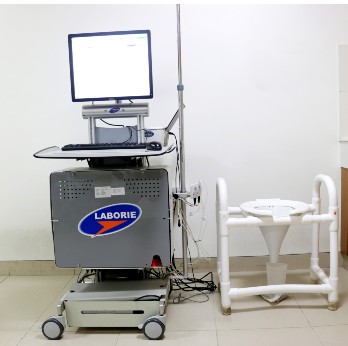MIOT’s Clinic for Urinary incontinence
Background:
Urinary incontinence means that you are not able to control when you urinate or leak urine unintentionally. This is a common problem known to affect millions of people.
The common types of incontinence include:
- Stress incontinence- Urine leakage happens during conditions of increased abdominal pressure like coughing, sneezing, laughing
- Urge incontinence- urine leakage occurs as when there is an intense urge to pass urine or soon after
- Overflow incontinence- Unable to empty the urinary bladder completely which leads to frequent leakage of urine
- Total incontinence- unable to store any urine and there is constant leakage of urine especially during standing and walking
Some patients may experience a combination of stress and urge incontinence as well depending on the underlying disease condition affecting the urinary bladder.
The incidence of urinary incontinence is approximately 25-45% in females. It is about 11-34% in older men with an average incontinence of 2-11%. Almost 60% of the patients do not seek medical advice due to lack of knowledge and access to medical facility.
How incontinence impacts peoples life:
Urinary incontinence can be an embarrassing and isolating condition and can negatively affect your physical and mental health. It can severely impact the quality of life. It can impact the happiness and negatively affect interpersonal relationships, social life, work and sexual life.
Probable causes of urinary incontinence:
Stress incontinence is usually the result of the weakening of or damage to the muscles used to control urination, such as the pelvic floor muscles and the muscles surrounding the bladder neck playing the role of sphincter.
Urge incontinence is the result of over activity of the detrusor muscles, which control the bladder.
Overflow incontinence is often caused by an obstruction or blockage in bladder, which prevents it from emptying fully.
Total incontinence may be caused by a problem with the bladder from birth, a spinal cord injury, or a small communication (opening) that can form between the bladder and a nearby area (fistula).
It can also be caused by:
- Pregnancy and child birth
- Obesity
- Family history
- Ageing
- Prostate enlargement
- Neurological
- Post trauma
Evaluation of cause of incontinence:
- Lab Investigations: Urine Routine + Renal Profile
- USG Abdomen
- Urologist consultation
- Rehab specialist consultation (If required)
Further Investigations:

- Urine Culture
- Uro-flowmetry: The patient will be asked to pass urine in a machine to assess the speed of urine flow and the time taken to complete urination. This is a non-invasive test which gives vital information about the urine flow.
- Urodynamic test: This is an invasive special test to assess the strength of bladder (detrusor) muscle. This test will aim to replicate the physiology of urination
- CT abdomen with contrast
- Serum PSA
Treatment options include:
- Lifestyle modifications involving exercises, dietician consultation and Psychology counselling
- Pelvic floor muscles training exercises
- Medical management
- Surgical management:
- Cystoscopy: Endoscopic examination to assess any blockage in the Urinary bladder or passage such as stones, Fistula from bladder to vagina(in females)
- Implantation of Artificial urinary sphincter in males
- Females: Stress urinary incontinence:
- Mid Urethral Sling surgery
- Transvaginal tape (TVT)
- Transobturator tape (TOT)
- Burch colposuspension
- Augmentation cystoplasty for neurological dysfunction
- Botulinum toxin injection
Infrastructure at MIOT:
- Urodynamic Lab: For comprehensive evaluation of both female and male incontinence issues
- MIOT Rehab Centre: For bladder rehabilitation programme to manage incontinence
- Operation Theatres: State-of-the-art OT set-up
- Incontinence due to
- Patients with diseases involving the spinal cord and bladder (myelodysplasia, multiple sclerosis, Parkinsonism, cerebrovascular accidents and spinal cord trauma or tumours)
- Post traumatic urinary incontinence
- Urinary-stone management
- Urethral strictures and bladder stones
- Incontinence post
- Reconstruction of urinary tract
- Repair of uro-gynaecological fistulae
- Reconstruction of urethral stricture
- Reconstruction for diseases like TB
- Correction of congenital abnormalities like congenital pelviureteric obstruction, megaureter, vesicoureteric reflux
- Correction of genital anomalies like hypospadias, epispadias exstrophy complex and cryptorchidism
This clinic also caters to:





